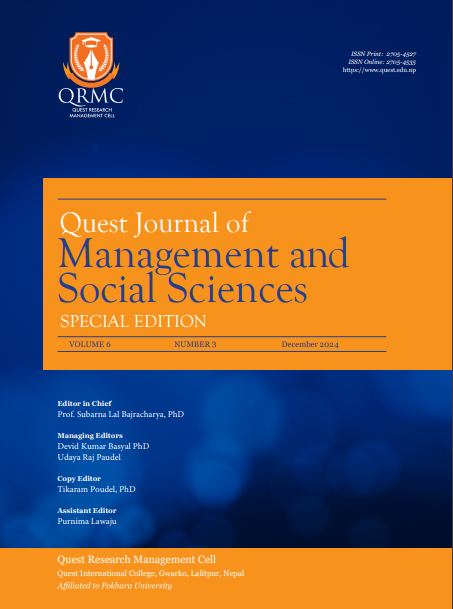Student Leadership in Volatile, Uncertain, Chaotic, and Ambiguous Business Environment: Experiment from the Complexity Leadership Theory
DOI:
https://doi.org/10.3126/qjmss.v6i3.72683Keywords:
VUCA, Student leadership, Complexity Leadership Theory, SEMAbstract
Purpose: Student leadership has become an increasingly critical issue over time. Despite the progress in some areas, the Volatile, Uncertain, Chaotic, and Ambiguous (VUCA) world still significantly hinders students' ability to lead in social, economic, and political spheres.
Methods: An explanatory research design was employed in this study. Convenience sampling is used to select participants, and a self-administered questionnaire is utilized. The questionnaire has been modified to align with the study's objectives. Data collection is conducted using the Kobo Toolbox in the Kathmandu Valley, and data analysis is performed using SmartPLS 4.0, which applies both descriptive and inferential data analysis techniques.
Findings: The findings indicate that most respondents are aware of and knowledgeable about VUCA. In the VUCA business environment, managing people and delegating work are considered significant challenges. The study identifies major solutions to address these issues, including providing hands-on experience learning opportunities and emphasizing the importance of soft skills. The research reveals that enabling, operational, and entrepreneurial leadership influence VUCA skills, benefiting researchers, future students, educational institutions, governments, and other business organizations.
Conclusion: The findings highlight that most respondents are familiar with VUCA and recognize managing people and delegation as the key challenges. The study suggests that enhancing VUCA skills through hands-on experience, soft skills training, and effective leadership can benefit various stakeholders, including researchers, students, and organizations.
Keywords: VUCA, Student leadership, Complexity Leadership Theory, SEM
JEL Classification: C21, C83
Downloads
Downloads
Published
How to Cite
Issue
Section
License
Copyright (c) 2024 Quest Journal of Management and Social Sciences

This work is licensed under a Creative Commons Attribution-NonCommercial-NoDerivatives 4.0 International License.
This license enables reusers to copy and distribute the material in any medium or format in unadapted form only, for noncommercial purposes only, and only so long as attribution is given to the creator.




